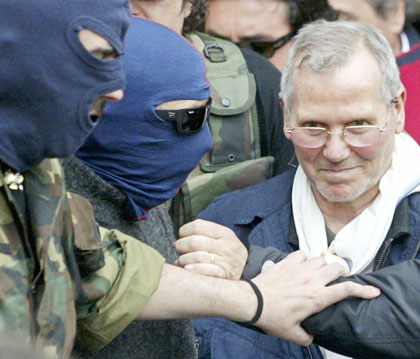PALERMO, Sicily - Italy's No. 1 fugitive and reputed Mafia "boss of bosses"
practically thumbed his nose at authorities for more than 40 years.
He counted on Sicilians' centuries-old mistrust of the state to help him on
the run, sleeping in islanders' homes, having his children born at local
hospitals, even sending the public health care system a bill for prostate
treatment abroad under a false name.

Italian police
officers lead Sicilian Mafia boss Bernardo Provenzano (R) from a police
station in the southern city of Palermo April 11, 2006. Provenzano, the
undisputed chief of the Sicilian Mafia who had been on the run for more
than four decades, was arrested while hiding in a farmhouse near Corleone
in Sicily on Tuesday, officials said.
[Reuters] |
But police finally caught up with
Bernardo "The Tractor" Provenzano on Tuesday in a farmhouse outside his power
base, Corleone ! the town that inspired the family name in "The Godfather."
In the end, Provenzano was done in not by an informer or a rival gangster,
but by a delivery of clean laundry. Police tracked the package to his hideout
and closed in when they saw his hand peek out of the door to take it.
Provenzano had escaped capture so often since going into hiding in 1963 that
he earned a place in the Italian imagination as "The Phantom of Corleone." He
got his nickname "The Tractor" for the determination he displayed in a mob
career that began as a hitman.
He is believed to have taken over leadership of the Sicilian Mafia following
the 1993 arrest of former boss Salvatore "Toto" Riina. During his years on the
run, Provenzano was convicted in absentia and given life sentences for more than
a dozen murders of mobsters and investigators.
"Bastard! Murderer!" a crowd shouted at the 73-year-old Provenzano as
black-hooded policemen took him out of a sedan and rushed him into the courtyard
of a police building in Palermo after driving him from the countryside.
Wearing tinted glasses and a wind-breaker, the gray-haired Provenzano held up
his handcuffed hands as he was hustled away but made no audible comment.
Investigators described an extensive operation to track down the mobster.
They said cameras that can see up to a mile were trained on suspected
accomplices as well as the Corleone home where Provenzano's wife and children
live.
A few days ago, police noticed a package leave the wife's house, then get
delivered by car to a series of other homes. On Tuesday morning, the package
left Corleone and was driven to the farmhouse where Provenzano was found staying
with a shepherd who doubled as a housekeeper.
"This morning he reached out with a hand to grab the package and that's when
we decided to move in," said Nicola Cavaliere, a top police official in Rome.
Italy's national anti-Mafia prosecutor, Piero Grasso, told reporters in Rome
that Provenzano was "impassive" and "didn't say a word" when arrested, but later
acknowledged his identity.
The last photos that investigators had of the mobster showed him as a young
man, but police gave the fugitive a "new face" last year ! issuing a composite
picture drawn with help from a Mafia turncoat in 2001 that depicted him with
white hair and hollow cheeks.
That effort also was helped by descriptions from personnel at a clinic in
Marseilles, France, where investigators say Provenzano sought treatment for a
prostate tumor two years ago.
Turncoats had told investigators that Provenzano slept in different
farmhouses every few nights across Sicily, an island where organized crime has
held sway for decades.
He allegedly gave orders with written notes ! not trusting cell phone
conversations for fear of being monitored by police. Grasso said investigators
were studying notes found at the farmhouse, along with a typewriter Provenzano
apparently used for writing them.
After taking over the top leadership, Provenzano helped the Mafia spread its
tentacles into the lucrative world of public works contracts in Sicily, turning
the mob into more of a white-collar industry of illegal activity ! with less
dependance on traditional operations like drug trafficking and extortion,
investigators have said.
During the years when Riina was the Mafia chieftain, murders bloodied Sicily.
Mob rivals, police, prosecutors and their bodyguards, and sometimes bystanders,
were cut down by bombings and drive-by shootings.
Then the bomb assassinations in Sicily of Italy's two top anti-Mafia
fighters, magistrates Giovanni Falcone and Paolo Borsellino, two months apart in
1992 galvanized many Sicilians against the mob, helping chip away at the
centuries-old "omerta" ! the island's code of silence and mistrust of
authorities.
Provenzano was among the Mafia bosses convicted of ordering Falcone's
slaying, but as mob boss he allowed fewer sensational killings and ordered more
infiltration of seemingly respectable people into real estate and financial
markets, Grasso has said.
While on Provenzano's trail, investigators uncovered a network of
"businessmen, technical experts, professionals and even politicians" who helped
the mobster, said Grasso, a Sicilian who as former chief Palermo prosecutor led
the hunt for the fugitive in the last few years.
But in the end, Grasso said, increasing heat from police drove Provenzano to
stay "in the safest places, that is, ones closest to Corleone," a bleak town
rising out of a rocky outcrop about 40 miles from Palermo.
With Provenzano's capture, investigators now must figure out who might
replace him as boss.
"As soon as the summit is decapitated, the structure feels the blow," Grasso
said ! but "the vacuum will be filled."